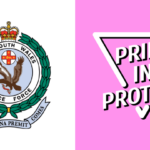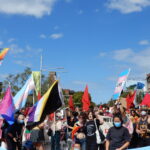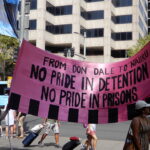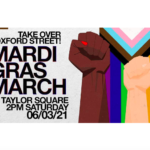While ‘Cops Out of Mardi Gras’ Is Nothing New, the Reaction to Thorpe’s Agitating Is
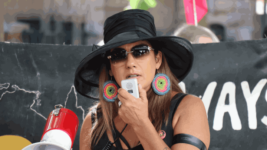
Opposition to the involvement of both the NSW Police Force and the Australian Federal Police in the Sydney Gay and Lesbian Mardi Gras has been long-term.
Pride in Protest has campaigned against it since 2018. And following the brutal policing of the 2013 event it was a communitywide issue.
Senator Lidia Thorpe was invited to join Pride in Protest’s No Pride in Genocide float at this year’s Mardi Gras parade, which marched along Sydney’s Oxford Street on 25 February.
No Pride in Genocide participants gathered at Sydney Town Hall mid-afternoon prior to the Mardi Gras event, where the anti-police message was clear.
So, when Thorpe decided to demonstrate against both the NSW police and the AFP during the parade, it was in keeping with the overall message of her group.
Indeed, the anti-police stance taken by Thorpe was similar to the sentiment espoused by the 78ers float. This was made up of the participants of the original 1978 Mardi Gras march, which was a protest violently suppressed by the NSW police officers of the day.
And while Thorpe wasn’t the first to take a stand against certain institutions participating in the LGBTIQA+ event, the reaction to her was, especially when considered alongside that resulting from the Department of Homo Affairs protest during the 2020 parade, which was mild in comparison.
The progressive No campaign
Similar to the blocking of the Liberals float by Homo Affairs, Thorpe brought a halt to a van by lying down in front of it, which served to prevent AFP officers from continuing their march, and she also argued with the NSW police officers who attempted to remove her from the event.
Whilst there’s been strong support for Thorpe in the wake of the incident, this has been drowned out by the louder condemnation of the senator coming from the mainstream media and many on their social channels.
And as Professor Chelsea Watego pointed out, much of the media coverage failed to mention Thorpe was demonstrating against police, which conveyed a false impression of what actually happened.
Certain media players have been running a smear campaign against Thorpe since last October, portraying her as the sole self-interested troublemaker in her opposition to the proposed referendum on enshrining an Indigenous voice to parliament in the Constitution.
But as evidenced at the nationwide Invasion Day protests in January, there’s widespread grassroots First Nations opposition to the Voice, which asserts that the advisory body won’t progress self-determination and rather, it will place Indigenous people in a subservient position to government.
Thorpe is the most prominent First Nations individual advocating the progressive opposition campaign to the Voice, and as there is a concerted effort to suppress this argument, the Djab Wurrung Gunnai and Gunditjmara woman is copping most of the flak.
Treaty before voice
“Trans women are women. Trans men are men,” said Thorpe, as she addressed the Pride in Protest rally at Sydney Town Hall prior to the Mardi Gras parade last Saturday.
Of course, as her words reveal, the independent Senator was at the event to celebrate queer identities just like everyone else.
Thorpe added that colonisers want First Nations people to be happy with the powerless advisory body on offer, in much the same way that they wanted Indigenous peoples to be happy with the sugar, flour and trinkets provided whilst they were locked up on reserves during the Protection era.
“We don’t need no more trinkets. We don’t need no more flour and sugar,” Thorpe made clear in concluding. “We want a treaty, and we want real power. And let’s rewrite this racist, homophobic Constitution once and for all.”


